
Featured Blog | This community-written post highlights the best of what the game industry has to offer. Read more like it on the Game Developer Blogs.
Crawl: The Open-Development Roguelike
Crawl is a Roguelike developed by 19 official developers and an entire player community.

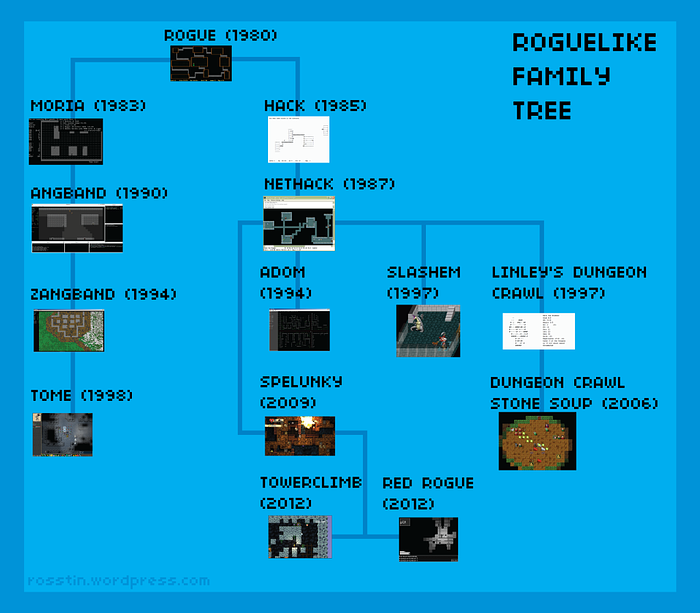
I couldn't figure out where to fit FTL.
Roguelikes are becoming increasingly relevant to mainstream gaming. Games like Spelunky, FTL, and even the Pokemon Mystery Dungeon series are all inspired by the gameplay of Roguelikes.
What is a Roguelike? Roguelikes are hardcore dungeon-crawlers with permadeath and procedurally generated environments. In a Roguelike, every playthrough is unique, and death is commonplace. Experimentation is usually required to identify magic items, which have randomized appearances, and some items may be cursed or harmful. In order to survive, players must learn the system thoroughly, plan their characters right, and adapt to unexpected and unfavorable situations. A typical player will play thousands of games before winning even once.
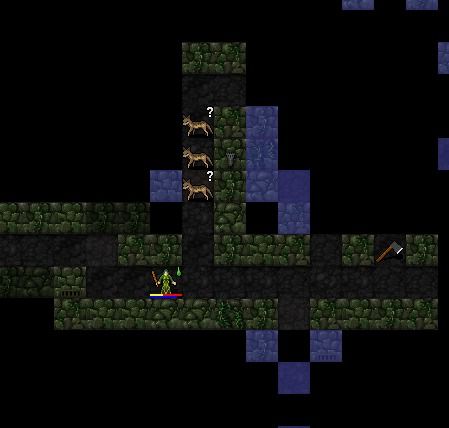
Psh, jackals. I can take 'em.
For example, in my last playthrough of Dungeon Crawl Stone Soup, I started as a Deep Dwarf Earth Elementalist. Deep Dwarves don't heal normally, and rely on consumables such as healing potions or wands, which are in very short supply. My plan was to worship Makhleb, a god who heals you as you kill monsters. Unfortunately, as I was looting weapons I accidentally wielded a club of distortion. Distortion weapons are very powerful... but if you unwield one it has a chance of sending you to the Abyss, an extremely dangerous late-game area. Because the weapon was a club, I was also unable to chop up corpses for food, and my character began to starve. I had a choice: I could search the dungeon for a spellbook containing Animate Skeleton, which has the side effect of generating chunks of meat from corpses, or I could unwield the weapon. I chose to attempt to remove the weapon, and was unluckily sent to the Abyss. In a desperate bid to escape, I converted to Lugonu, God of the Abyss, who teleported me back into the main dungeon. However, Makhleb does not take kindly to turncloaks, and after my wand of healing ran out of charges, his wrath proved the end of me.Dungeon Crawl Stone Soup is one of the most actively-developed traditional Roguelikes, and is particularly good at forcing tactical and strategic conundrums like the one above. To DCSS’s success, I credit two things:
an open-source development model
an elegant set of clear philosophies that guide development
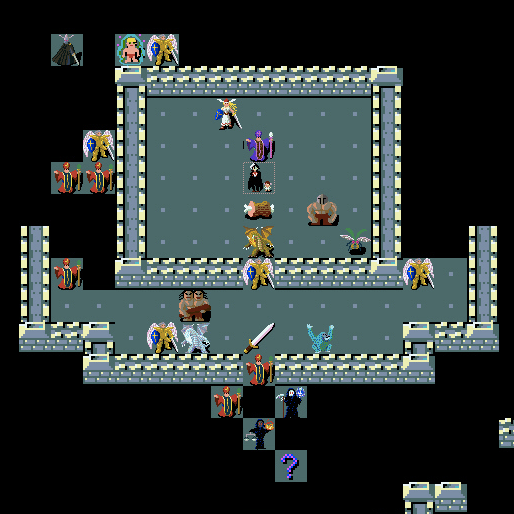
Nethack, you were my first love.
The open-source development model brought Linley’s Dungeon Crawl back from the grave. Let’s compare DCSS to another popular roguelike: Nethack. While Greensnark and Erik Piper were contacting Linley, Nethack’s devs had just completed their latest release, Nethack 3.4.3. Then they disappeared. While DCSS has flourished in open-source development (beating Dwarf Fortress for the title of Best Roguelike of 2008), Nethack’s devs haven’t been heard from in almost 10 years. Although a number of developers have expressed desire to carry Nethack’s torch into the future, Nethack’s closed-off model and the silence of its devteam have stifled further progress. Development of Nethack 4 by a new team has recently started, and the new team has been under fire from those who accuse them of violating the Nethack Devs’ original vision and their development policy. Because of the doubt created in Nethack’s loyal players, I doubt that the Nethack 4 team will have as much success as the DCSS team.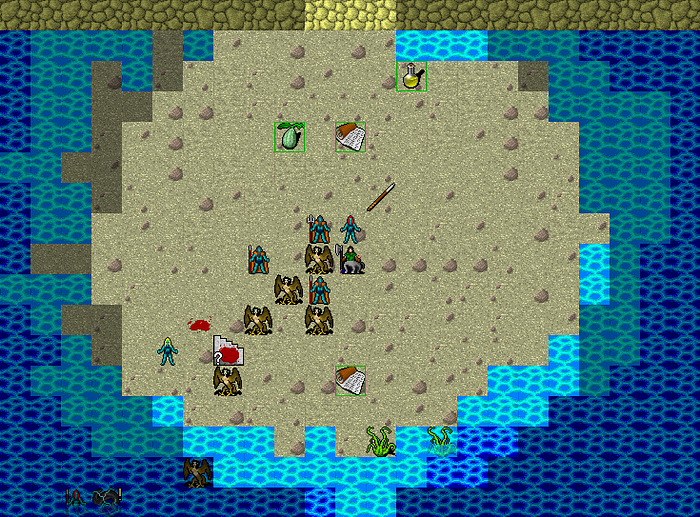
Watch out for the tides.
So, Crawl outlived Nethack by continuing to be actively developed, but has it improved? The first addition to the DCSS fork of Crawl was the auto-explore feature. Auto-explore allowed players to explore the dungeon simply by pressing the “o” key, with the player character stopping only upon seeing a dangerous monster or useful item. This feature was at-first controversial; what’s the point of playing the game if it plays itself? However, what this feature actually did was remove the tedium of wandering around the dungeon in favor of quickly getting the player to the interesting decisions that are the meat of the game: Fight or flee a dangerous monster? Descend a stairway in search of food, or finish exploring the current floor? Try a mysterious new potion, or wait to find a scroll of identify? The addition of features like auto-explore, tutorials, an online server for tournaments, and a beautiful graphical tileset led to an influx of new players.The now-popular auto-explore feature was a result of one of Crawl’s core philosophies: “Gameplay supporting painless interface and newbie support.” Very few roguelikes have a tutorial, but Crawl does... an excellent one. For that matter, very few roguelikes have a section in their manual about their development philosophy. I think that Crawl’s philosophy guidelines are a big part of what makes it able to support a large team of developers.
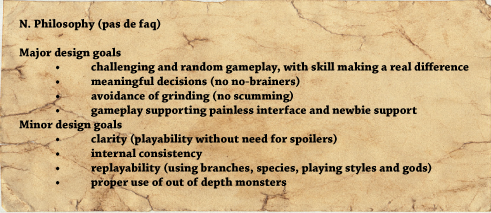
dpeg is quite the philosopher.
DCSS is developed using a Gitorious repository, and has expanded from 1 developer in 1997, to 2 developers in 2006, to now 19 official developers and dozens of player contributors. The team of official developers act as gatekeepers for suggestions and commits by other developers, leading discussion and being guided by the game’s philosophy. If a developer is particularly active, they are added to the official team. A wiki is used to collect and debate suggestions from interested designers, and no coding experience is required to contribute. For each new version of Crawl, the devs hold a forum on new features. The features are informally ranked, and the team implements the most desired contenders. The result of this process is that DCSS is full of content. Aside from Crawl’s randomly generated 27-floor dungeon, each game is generated with random branches such as the Swamp, Shoals, Spider’s Lair, and Snake Pit, only two of which exist in any game. There are 24 races with unique playstyles, including Demonspawn, Tengu, Ghouls, Merfolk, and Mummies. A wide variety of cruel and unusual Gods add even more diversity to the game: Elyvilon gives players tools to heal and befriend monsters, while Xom requires players to amuse him with dangerous antics.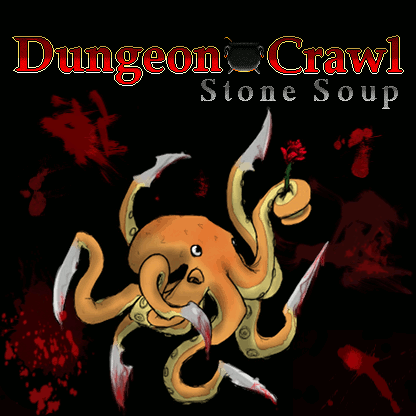
What could be better than an 8-armed wizard? An 8-armed wizard with BLADE HANDS.
All this content naturally leads to some things being cut. Linley’s Dungeon Crawl originally contained a number of redundant fantasy races, including a large number of elves. Dungeon Crawl Stone Soup has added strange new races such as the handless Felids and the 8-limbed Octopodes, and at the same time removed many of the original races. The removal of Mountain Dwarves in version 0.10 was met with rage from some players, with many joking that the Mountain Dwarves had left for Dwarf Fortress. However, this shows that the devs are careful about what goes into Crawl. They strive to keep only the very best things in, even if it means taking some good things out.
Crawl’s playercount has shot up since it became open-development. No one could have expected that it would beat out Nethack and Dwarf Fortress to claim the throne as most popular roguelike in the late 2000s. The developers of Crawl have proven that with the right design, philosophies, and community, a game can be greatly improved in an open-source, open-development environment. Dungeon Crawl Stone Soup can be downloaded here. If you love to die, you won't be disappointed.
Takeaways:
Switching to open-development is a great way to keep a project alive when the original developer loses interest.
Having centralized, publicly-readable core philosophies is a boon to an open-source project. It keeps developers on-track and tells players what to expect.
The most committed developers should act as gatekeepers, to decide what content gets in and what doesn't.
Rosstin Murphy's team recently released King's Ascent on Newgrounds! He's also working on level design for Rex Rocket. He's a big fan of Roguelikes and loves to die.
Read more about:
Featured BlogsAbout the Author(s)
You May Also Like













